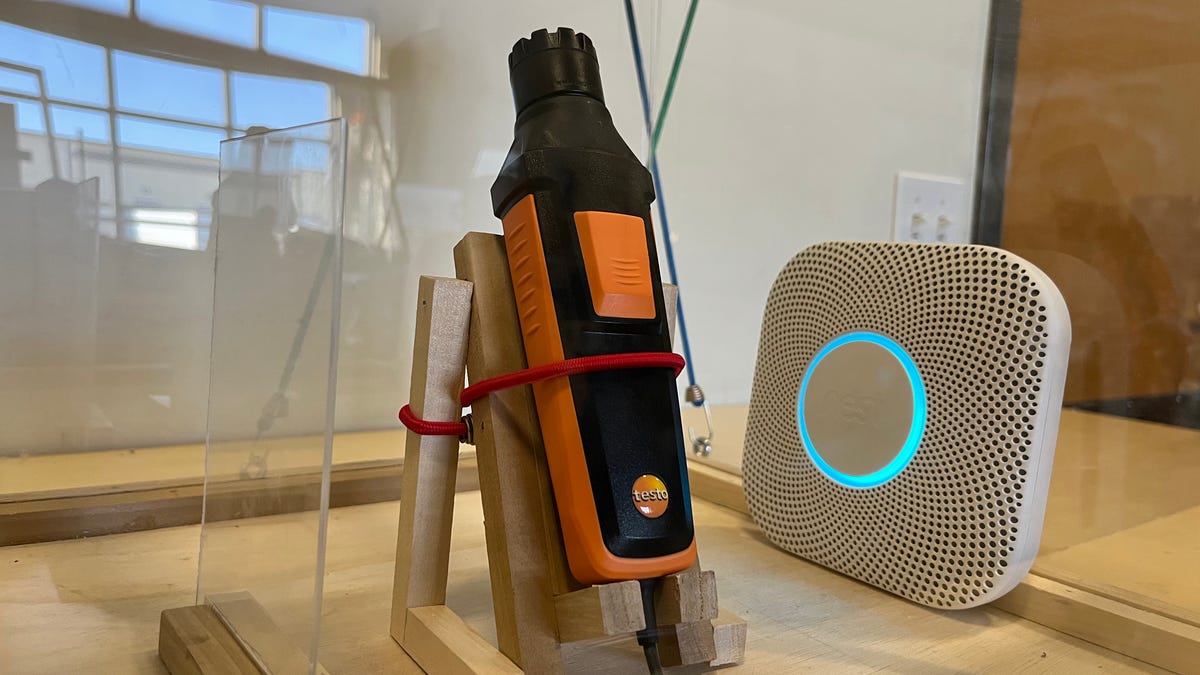
To put these detectors to the test, we took to the lab and built a test rig designed to measure each unit’s response time to varying concentrations of carbon monoxide, specifically at 250 ppm and 400 ppm. Our goal was to determine each detector’s respective effectiveness at detecting potentially hazardous levels of carbon monoxide. To declare our winners, we also took into account features that add to the overall user experience, performance and cost-efficiency of each unit.
For the 250 ppm concentration level, we try to simulate a situation where carbon monoxide has begun to build up to hazardous levels. We test twice at this concentration and average the results. At 400 ppm, we replicate a worst-case scenario, a potentially deadly situation, and give the units a pass or fail score. Spoiler alert: They will all save your life, which goes to show how important it is to have a carbon monoxide detector installed on every floor of your home.
Our custom-built carbon monoxide detector test station. It’s one of the deadliest things we’ve ever put together in our product testing lab.
This is one of the most dangerous tests we’ve ever conducted. Carbon monoxide exposure is no joke. It’s virtually undetectable and quite deadly. We needed to create a safe way of testing carbon monoxide detectors without risking the health and safety of our laboratory staff. I made use of my rudimentary carpentry skills and built a CO detector test station. Its components are:
CO detector chamber — made using wood, plexiglass, silicon, tape and a bunch of finish nails.
CO tank with gas flow regulator — cylinder tank containing CO at 2,500 ppm and balance air.
Testo 300 with CO Ambient sensor — our control device for this experiment.
Two portable CO gas alarms.
A look at the interior of CNET’s carbon monoxide detector test rig.
The chamber houses two carbon monoxide detecting devices, a) the CO Ambient sensor portion of our control device, the Testo 300, which is a combustion analyzer used by heating engineers who carry out installation and routine maintenance of industrial and residential heating systems, and b) the unit under test, or UUT, which takes the place of each carbon monoxide detector we tested for you. The chamber is sealed with foam but not air-tight, since we’re not particularly interested in making a CO bomb.
We use a portable CO alarm on the gas regulator to keep a nose out for leaks.
We installed a gas flow regulator on our tank to avoid pressure spikes, followed by a gas line to feed our gas mixture into the chamber. Two additional portable CO detectors are used. One near the valve, to ensure there are no leaks and another that must be worn by the person conducting the experiment, to make sure there is no CO buildup in the test station area. On top of all that, our respirator suits and amply ventilated location ensure that we get a constant stream of fresh air at all times. This might all sound excessive, but it’s always good laboratory practice to put safety first, especially when you’re dealing with such a stealthy and prolific killer.
We start by feeding our gas mixture to the chamber and closely monitoring the carbon monoxide concentration on the Testo. Once the concentration inside our chamber reaches at least 250 ppm or 400 ppm, we stop feeding the gas and start a timer. We want to assess how long the carbon monoxide detectors take to react to those conditions. As you may understand, we wanted to limit our exposure while making sure our results were repeatable.
Our results are summarized in the interactive graph below:
